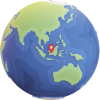Case studies are organised by region, with each region featuring links to the countries where the case studies are located.
Gabon

In Gabon, the temporary suspension of a timber traceability monitoring system in 2023 raised suspicions of corruption within the Ministry of Water and Forests. Gabon has 88% forest cover, making forestry a major economic sector and a key area of interest for foreign companies. Timber originating from the country’s Nkok Special Investment Zone (SIZ), set up to promote local wood processing, must meet EU sustainability certifications. To ensure this, the TraCer monitoring system traces the origin of harvested wood and the methods used in extracting wood from this zone. Yet, in March 2023, the system was briefly suspended for a month due to administrative issues.
This suspension raised concerns in regard to corruption within Gabon’s Ministry of Water and Forests. Government inconsistencies concerning the verification of traceability and legality of timber entering the Nkok SIZ have notably been uncovered. In addition, allegations suggest that officials from the Ministry of Water and Forests were complicit in illicit timber operations when suspending the TraCer. The "Kevazingogate" scandal, which involved extensive trafficking of kevazingo, a protected wood species, despite a ban on its export, also exacerbated these suspicions. Officials from both the customs office and the Ministry of Water and Forests were implicated, highlighting systemic issues within Gabon's forestry sector.
Keywords: Sub-Saharan Africa, Gabon, timber, primary production, illegal timber trade, corruption and bribery
Sources: https://news.mongabay.com/2023/05/corruption-threatens-timber-traceability-in-nkok-gabon/
Guatemala

A Guatemalan palm oil company, linked to an oil spill into Guatemala's Pasion River and to numerous human rights abuses, has been charged with corruption and fraud. According to Friends of the Earth, Reforestadora de Palma S.A. (RESPA) was involved in an immense fish kill along the Pasión River in 2015 due to pollution from their processing plant, affecting 12,000 people. The company was charged with "ecocide" but the ruling was not enforced after the murder of a key plaintiff, Indigenous leader Rigoberto Lima Choc. Subsequent investigation revealed REPSA’s involvement in several illegal activities such as corporate corruption and environmental mismanagement. Such issues are systemic in Guatemala, where corruption is high, with REPSA being amongst nine companies other charged with influence peddling and bribery. Four high-level executives, including directors Hugo and Juan Milton Molina Botrán, face arrest orders. In addition, REPSA is also allegedly involved in several human rights abuses, rampant in Guatemala’s palm oil sector. Despite the devastating impact of this scandal, the Rainforest Action Network reported in 2021 that Cargill and Nestlé had quietly resumed sourcing palm oil from REPSA. These commercial ties were suspended following the 2018 arrest of REPSA executives, but have since resumed.
Keywords: Latin America, Guatemala, palm oil, primary production, corruption and bribery, human rights violations
Sources: https://www.ran.org/press-releases/cargill-nestle-resumed-palm-oil-sourcing-in-guatemala-despite-legacy-of-violence-and-intimidation-advocates-find/

According to an InSight Crime analysis, illegal jade trafficking is on the rise in Guatemala, particularly in the coastal region east of the country known as a cocaine corridor. This high-value gemstone is in high demand in China, leading to an increase in illegal extraction and transportation operations. These operations are allegedly facilitated by high-level authorities and politicians, according to investigations by the Public Prosecutor’s Office. On October 1, Guatemalan police seized a container with 10 tons of unprocessed jade that had been extracted near Morales, one of the most important cities in Izabal. Prosecutors suspect a network of political influences facilitating the entire operation, as the traffickers needed to circumvent mining and environmental controls before the jade left the port of Santo Tomás de Castilla, on the Caribbean coast of Izabal.
Keywords: Latin America, Guatemala, jade, mining, primary production, trade and transport, illegal mining, corruption and bribery
Source: https://insightcrime.org/news/analysis/jade-new-crown-jewel-guatemala/
Honduras

Illegal timber and drug trafficking are closely intertwined in northeastern Honduras, particularly in the town of Dulce Nombre de Culmí. The nearby forests of pine, mahogany, and cedar feed a timber trade worth around $60-80 million between 2016 and 2018. However, environmental agencies warn that 50-60% of this trade comes from illegal logging, much of it from the country’s northeastern natural reserves where drug trafficking is also prevalent.
Culmí is the last settlement before entering the Río Plátano Biosphere, a protected forest where drug trafficking and illegal logging have crossed paths for over a decade. The mountains and plains surrounding Culmí are dotted with clandestine airstrips, many built during the drug boom a decade ago. These airstrips, carved from the dense forests in the area, were then used to sell wood to timber traffickers and drug trafficking groups.
In Olancho, Yoro, and Gracias a Dios—three departments renowned for their timber production—drug trafficking groups are known to engage in timber trafficking. Groups of farmers, often migrants from the poorest areas of southern Honduras, settle in unpopulated lands in and around the Río Plátano Biosphere. There, they harvest wood illegally, often with protection from corrupt officials and politicians, as well as support from drug trafficking groups.
The wood is usually cut without securing official permission from Honduras’ Institute of Forest Conservation. It is then combined with legal shipments, mostly at the sawmills, either by falsifying logging permits or bribing police responsible for monitoring timber transport. Meanwhile, illegally harvested precious woods, such as mahogany and cedar, usually head north along clandestine routes to the department of Gracias a Dios, and from there to processing hubs such as La Ceiba. These are the same routes that drug shipments travel along.
Keywords: Latin America, Honduras, timber, primary production, drug trafficking, illegal logging, illegal timber trade, fraudulent documentation, corruption and bribery
Source: https://news.mongabay.com/2021/04/drugs-and-agriculture-cause-deforestation-to-skyrocket-at-honduran-unesco-site/
Indonesia

According to The Diplomat, the Indonesian government has charged Harvey Moeis, a prominent businessman in the mining sector, with corruption related to illegal tin mining operations. Moeis is accused of colluding with officials from PT Timah, a state-owned mining company, to establish unpermitted mining operations on PT Timah's concessions. While some have held that the environmental damage caused by these operations can be estimated at $26 billion, others argue this is likely exaggerated and used to draw public attention to the case. PT Timah holds numerous mining permits and extensive land rights, mainly on Bangka Belitung island. The illegal mining activities took place there, with PT Timah allegedly allowing private firms to operate on its concessions and even leasing smelting equipment to them. This case emerged after increased scrutiny following PT Timah and other mining companies consolidation under MIND ID, a state-owned holding company. PT Timah's financial struggles, including a $28 million loss in 2023, prompted closer examination of its activities, revealing the illegal mining scheme.
Keywords: South East Asia & Pacific, Indonesia, minerals, tin, primary production, illegal mining, corruption and bribery
Sources: https://thediplomat.com/2024/05/did-illegal-tin-mines-really-steal-26-billion-from-the-indonesian-state/

Mongabay reports that Indonesian prosecutors have charged three major palm oil companies, Permata Hijau Group, Wilmar Nabati Indonesia, and Musim Mas, with corruption related to a cooking oil shortage in 2022. It was revealed that executives from these companies had bribed a trade ministry official to secure export permits for their crude palm oil. These permits allowed the companies to bypass the government-imposed domestic market obligation (DMO) and domestic price obligation (DPO). The DMO required companies to allocate a certain quota of palm oil for the domestic market to ensure supply during the shortage. The DPO capped the selling price of palm oil domestically to keep it affordable for consumers. Overall, the company’s fraudulent behaviour allowed them to sell palm oil abroad at higher prices rather than adhering to domestic price caps and quotas intended to address the shortage. This corruption caused state losses estimated at 6.47 trillion rupiah ($432 million). The executives and the official have already been convicted and jailed, with sentences recently extended.
Keywords: South East Asia & Pacific, Indonesia, palm oil, primary production, trade and transport, corruption and bribery
Sources: https://news.mongabay.com/2023/06/palm-oil-giants-face-corruption-charges-as-indonesia-probe-widens/

Indonesian palm oil is a significant import for the US (with 2022 imports of palm oil being valued at $1.9 billion) and is used in various U.S industries from food production to cosmetics. Indonesia has been identified as the largest source of deforestation exposure for US imports for the period October 2021 to November 2023, with oil palm accounting for 96.7% of this exposure. This exposure is linked to the fact that the expansion of palm oil plantations in Indonesia to meet global demand has led to massive forest loss, as forest areas are cleared to make way for production.
US palm oil imports are inextricably linked to the palm oil industry in Indonesia, which is characterised by widespread corruption and bribery, and there is a general lack of transparency in palm oil companies’ political activities and how they can interfere with government policies. Notably, high-profile cases such as that of palm oil tycoon Darmadi highlight how corruption facilitates illegal land conversion and deforestation. Damardi was sentenced to 15 years in prison for bribing officials to convert protected forests into palm oil plantations, resulting in substantial environmental damage.
The production of palm oil in Indonesia is also associated with exploitative labour conditions and human rights abuses. Workers on plantations often endure poor working conditions, low wages, and lack of job security. Indigenous communities, such as the Ibans and Orang Rimbas, face land dispossession and livelihood disruptions due to the expansion of palm oil plantations.
Keywords: South East Asia & Pacific, Indonesia, palm oil, trade and transport, corruption and bribery, illegal deforestation
Sources: https://www.dol.gov/sites/dolgov/files/ILAB/images/storyboards/palm-oil/Palm-Oil.pdf
https://www.aljazeera.com/economy/2023/2/24/indonesias-palm-oil-tycoon-darmadi-gets-15-years-for-corruption
https://news.mongabay.com/2024/02/palm-oil-deforestation-makes-comeback-in-indonesia-after-decade-long-slump/


The Environmental Crimes Financial Toolkit is developed by WWF and Themis, with support from the Climate Solutions Partnership (CSP). The CSP is a philanthropic collaboration between HSBC, WRI and WWF, with a global network of local partners, aiming at scaling up innovative nature-based solutions, and supporting the transition of the energy sector to renewables in Asia, by combining our resources, knowledge, and insight.


